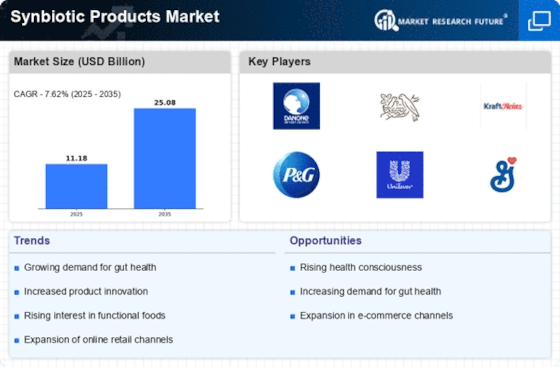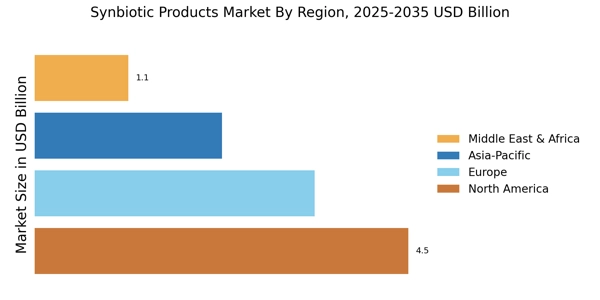Expansion of E-commerce Platforms
The expansion of e-commerce platforms is transforming the retail landscape for the Synbiotic Products Market. With the rise of online shopping, consumers now have greater access to a diverse range of synbiotic products. E-commerce allows for convenient purchasing options, enabling consumers to explore various brands and formulations from the comfort of their homes. This shift is particularly beneficial for niche products that may not be widely available in traditional retail settings. Market analysis indicates that online sales of health and wellness products, including synbiotics, are experiencing significant growth, driven by the increasing preference for online shopping. As e-commerce continues to flourish, it is expected to play a crucial role in expanding the reach of synbiotic products, thereby contributing to the overall growth of the Synbiotic Products Market.
Increasing Demand for Functional Foods
The rising consumer inclination towards functional foods is a pivotal driver for the Synbiotic Products Market. As individuals become more health-conscious, they seek products that offer additional health benefits beyond basic nutrition. This trend is reflected in the growing sales of functional foods, which have seen a compound annual growth rate of approximately 8% in recent years. Synbiotic products, which combine probiotics and prebiotics, are particularly appealing as they are perceived to enhance gut health and overall well-being. The increasing awareness of the link between gut health and various health conditions further propels this demand. Consequently, manufacturers are focusing on developing innovative synbiotic formulations to cater to this burgeoning market, thereby driving growth in the Synbiotic Products Market.
Advancements in Research and Development
Ongoing advancements in research and development are propelling the Synbiotic Products Market forward. Scientific studies continue to unveil the health benefits associated with synbiotics, leading to increased consumer trust and interest. Innovations in formulation techniques and delivery systems are enhancing the efficacy of synbiotic products, making them more appealing to consumers. For instance, encapsulation technologies are being explored to improve the stability and bioavailability of probiotics and prebiotics. Furthermore, the collaboration between food scientists and health professionals is fostering the development of targeted synbiotic products tailored to specific health needs. This focus on R&D not only enhances product offerings but also positions the Synbiotic Products Market as a leader in the functional food sector, potentially attracting a wider consumer base.
Rising Prevalence of Digestive Disorders
The escalating incidence of digestive disorders is significantly influencing the Synbiotic Products Market. Conditions such as irritable bowel syndrome, constipation, and inflammatory bowel disease are becoming increasingly common, prompting consumers to seek effective dietary solutions. Research indicates that synbiotic products can play a crucial role in alleviating these conditions by promoting a balanced gut microbiome. The market for digestive health products is projected to reach substantial figures, with synbiotics expected to capture a notable share due to their dual-action benefits. This trend is further supported by healthcare professionals recommending synbiotics as part of dietary interventions for digestive health. As awareness of these products grows, the Synbiotic Products Market is likely to experience robust growth driven by the need for effective digestive health solutions.
Growing Interest in Preventive Healthcare
The shift towards preventive healthcare is a notable driver for the Synbiotic Products Market. Consumers are increasingly prioritizing health maintenance over disease treatment, leading to a surge in demand for products that support overall wellness. Synbiotic products, known for their role in enhancing gut health and immune function, align perfectly with this preventive approach. Market data suggests that the preventive healthcare market is expanding rapidly, with consumers willing to invest in products that promise long-term health benefits. This trend is further supported by health campaigns promoting the importance of gut health in disease prevention. As a result, the Synbiotic Products Market is likely to benefit from this growing consumer mindset, with an increasing number of individuals seeking synbiotic solutions as part of their daily health regimen.

















